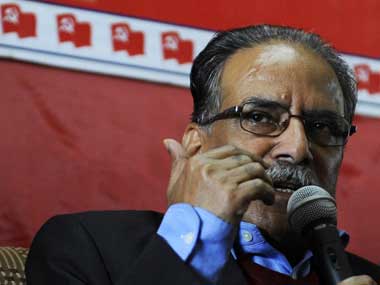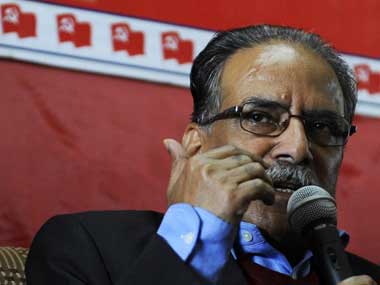India needs to be worried over the political developments in Nepal , an important contiguous neighbour with which India shares a 1751-km-long porous border, free of visa regime. The Maoists, led by Pushpa Kamal Dahal ‘Prachanda’, have performed poorly in the 19 November election to choose a 601-member Constituent Assembly (CA) that will draft the land-locked mountain state’s new constitution. Prachanda lost the election from the Kathmandu Constituency 10 (though he contested the election from another seat as well) and his daughter was defeated too. Clearly, the Maoists have had their nose rubbed in the dirt. The Maoists have now rocked the boat by announcing their post-poll boycott and instructing their newly-elected legislators to withdraw after the party’s shocking defeat. Any turbulence in Nepal ’s politics is bad for India , particularly when the development promises to be the harbinger of instability in the neighbouring friendly nation. Unfortunately there isn’t a full political consensus in Nepal that elections to the Constituent Assembly are the best way to go forward. Prachanda’s party, the United Communist Party of Nepal, itself split into two factions. [caption id=“attachment_1246563” align=“alignleft” width=“380”]  Prachanda has alleged that the national elections were riggged. AFP[/caption] One of the factions, the more radical faction led by Mohan Baidya who leads 33 fringe parties, felt that Prachanda and Baburam Bhattarai compromised too much on the revolutionary ideals and allowed the People’s Liberation Army of the Maoists to be humiliated. Their basic argument is that they sold out to India and hence they have been very critical of this peace process. The significance of these elections from the Indian viewpoint cannot be overstated. Nepal is possibly the only country in the world which is going in for a second round of Constituent Assembly elections because the first Constituent Assembly was unable to finalise a Constitution. The current developments have their genesis in recent political history of Nepal which started the peace process in 2005 with the discussions between the late Girija Prasad Koirala (four-time Prime Minister of Nepal) and the Maoists. These talks resulted in the Comprehensive Peace Agreement of 2006. However, the process remained inconclusive till date as it has to culminate in a new Constitution which has not happened. Thus, two political objectives remain inconclusive in Nepal : the transition process, and the process of mainstreaming the Maoists. A decade ago, when Nepal was in the midst of a political insurgency, the Maoists were in control of large parts of the country. It was the most trying and testing period for Nepal as it was stuck in a military stalemate, with the Maoists in control of large parts of rural Nepal and the Army in the District Headquarters and the cities. A political solution to the stalemate was the only answer to this stalemate and the sole hope for the nation. This political solution was that the Maoists be brought back into the national political mainstream and the political process with a pre-condition that the Maoists leave the path of violence. This is what happened. This is where the world has to give the Nepalese their due in their current difficult times and understand that such massive changes do take time to come to fruition. On that score, Nepal has clearly achieved a lot. Nepal has disbanded the People’s Liberation Army. The Maoists have laid down their arms. Some of their ex-combatants have joined the Nepalese Army. The Maoist party is now a political party which participated in the 2008 Constituent Assembly elections and even formed a government. Also, Nepal has achieved a lot in terms of ending violence, restoring peace, having democratic elections. But this is not enough and the Nepalese have still a long way to go. But the problem is that what has not been achieved rankles as much, or perhaps even more than that, as what has been achieved. What has not been completed is the initial proclamation of the first Constituent Assembly declaring Nepal to be a Republic, declaring Nepal to be a secular state and to be a federal state. These are essentially proclamations and have not been codified in terms of a new Constitution. That is why the peace process has not been completed. Right now, Nepal is going through three major transformations: (i) moving from a Hindu state to secular state, (ii) from a Constitutional monarchy to a Republic, and (iii) from a unitary state to a federal state. The last Constituent Assembly basically failed because they could not agree on core issues like the question of federalism, the structure of the government, whether the government should have presidential or parliamentary prime ministerial form, or a mixed system. Despite the political hurly-burly in Nepal , the country has undergone a fundamental change, and the Maoists were the initiators of this fundamental transformation in the political process in Nepal . Today’s Nepal is starkly different from the Nepal of ten years ago. The political process the country has chosen to embark upon is now irreversible. New political actors have come on to the scene and the Maoists are one of the most important of those. Besides, there is an intense political awakening amongst the Madhesis that were traditionally discriminated in Nepal . These are the people who live in the Terai bordering the Indian states of UP and Bihar . They have gone through their own share of agitations and political movements and for the first time the Madhesis actually had a very strong political voice. They had 43 seats in the first-past-the-post system in the last Constituent Assembly. Another factor of change is the awakening of the Janajatis. Roughly 20 to 25 per cent of the people of Nepal belong to the Janajati community. Along with the Madhesis, the Janajatis are now also articulating their desire for political rights or for a more active participation in the political process, though they are not as strong as the Madhesi parties are. One can argue that Nepal is trying to achieve too much in one go. That perhaps is the malady. But then it is a lofty goal that the Nepalese are pursuing for improving their lot and the international community needs to be sensitized to these very major transformations that the Nepalese are seeking to induct into their political system. The international community needs to be patient and allow due time and space for the Nepalese to achieve these lofty objectives. The Nepalese politics is going through a tailspin. India will be keeping its fingers crossed on the outcome of the election results and the politics that will inevitably follow. The writer is a FirstPost columnist and a strategic analyst who tweets @Kishkindha.
This is where the world has to give the Nepalese their due in their current difficult times and understand that such massive changes do take time to come to fruition.
Advertisement
End of Article
Written by Rajeev Sharma
Consulting Editor, First Post. Strategic analyst. Political commentator. Twitter handle @Kishkindha. see more


)

)
)
)
)
)
)
)
)



